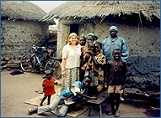Karen Voetsch Continues to Give Back as President of the Atlanta Area Returned Peace Corps Volunteer Group

Karen Voetsch, MPH, is a public health analyst and acting team lead for Policy, Communications, and Partnerships for the Steps to a HealthierUS Program, which supports community-based chronic disease prevention programs in states, cities, and tribal areas. She’s been at CDC four years.
From 1996 to 1998, she was a health education/community development volunteer in Guinea, West Africa. "After completing my undergraduate education, I was very interested in pursuing volunteer service and was very impressed with the mission and history of the Peace Corps. I also welcomed the opportunity to live in a different cultural environment and learn another language." She speaks French and is conversant in Malinké
As a community development/health education volunteer, Voetsch did many different things, she says. "One of the challenges was that the job was pretty undefined. I started working at the local health center and conducted health education sessions related to malaria, malnutrition, and diarrhea, which were the three most prevalent diseases in my village. Over time I found that women’s health and education were important issues in the community. In collaboration with local school teachers, I organized a girls’ soccer team where the students had an opportunity to exercise and have fun, while also learning about women’s health issues and the importance of staying in school. We also obtained funding to renovate the local middle school and helped organize a regional women’s health conference. I was able to do so many different things and came to appreciate the flexibility of my role as a volunteer."
Her time in the Peace Corps taught her that the physical, cultural, and social environment have a very significant influence on people’s beliefs and behaviors, she says. "After the Peace Corps, I wanted to get a better understanding of the science behind behavior change. Public health was a discipline that supported the things I had learned overseas and provided me with a way to put them into practice."
Voetsch says her Peace Corps experience contributed to her understanding of community health and assists in her current position. "I learned that gaining an understanding of a community’s needs and working in collaboration with community members and stakeholders are instrumental to success. I am mindful of these lessons in working with state, city, and tribal grantees and our national partners. "Many Peace Corps Volunteers will say that they got much more out of the experience than they felt they put into it," she says, "and I have always felt the same way and wanted to continue my involvement with the Peace Corps. One of the many ways that Returned Peace Corps Volunteers ‘give back’ is to organize or become involved in a local organization of returned volunteers to fulfill the third goal of Peace Corps: ‘helping to promote a better understanding of other peoples on the part of Americans.’ "
She says she’s learned a lot about working effectively in different cultural settings and gaining trust and buy in from organizations and communities. "In many cultures, it’s the process that matters and not the outcome, so the ways in which you interact and communicate with people can become much more important than the things you actually achieve. It also takes a good understanding of yourself, your abilities to make a contribution, and your flexibility to roll with the punches with a good sense of humor"
Currently, Voetsch is the President of the Atlanta Area Returned Peace Corps Volunteer Group. "As an association, we provide a supportive community for Returned Peace Corps Volunteers to perform community service, promote global understanding, and advance civic engagement in the Atlanta area. We volunteer in the community, we organize educational and social events, and we fund one major Peace Corps project overseas. If there are other RPCVs out there at CDC, I would encourage them to visit our website at www.aarpcv.org and join the organization."
- Page last reviewed: January 7, 2015
- Page last updated: January 7, 2015
- Content source:
Global Health
Notice: Linking to a non-federal site does not constitute an endorsement by HHS, CDC or any of its employees of the sponsors or the information and products presented on the site.


 ShareCompartir
ShareCompartir